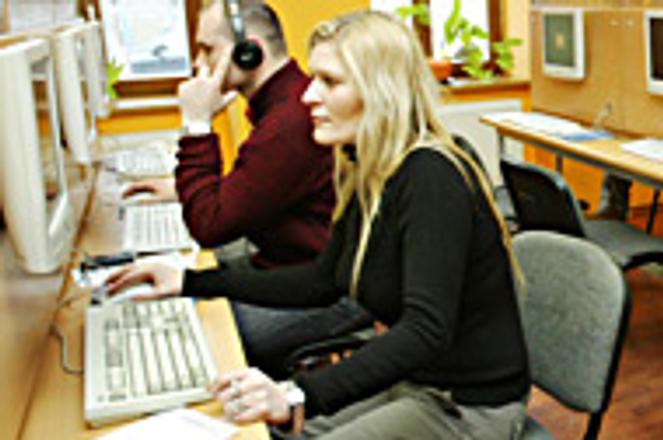INTERNET cafes are great for chat - not for personal banking.
photo: SME - Miroslava Cibulková
THE NUMBER of clients who turn to their PC to do their banking in Slovakia is growing fast.
It is a win-win situation. Clients are able to save the time, and bank workers are able to focus more on consultancy services instead of simple cash transactions.
Banks are promoting electronic banking through a range of products, as well as lower fees for clients if they carry out certain transactions online.
"Electronic banking is becoming a crucial channel for transactions between a client and a bank," Michal Grajciar, head of the payment and electronic banking department of Slovenská sporiteľňa bank, told The Slovak Spectator.
He added that the bank is trying to change the perception of bank branches as a place for cash transactions. And it is succeeding. "Currently, it is mainly consultancy and the sale of sophisticated products that take place in branches," Grajciar said.
Roman Začka, director of the public relations department at the Tatra banka, pointed out: "Of course, it is possible to arrange everything that is available electronically in person as well. But the phone, fax and PC were created to make people's lives easier, more comfortable, and save them time."
"Because a client can do everyday operations online, the branches have more time for complex advisory services," Začka continued.
According to Alena Walterová, spokeswoman for the VÚB bank, online banking results in fewer banking errors, by both the bank and the client.
"Additionally, some electronic banking products for firms are able to communicate with companies' accounting systems and automatically do things that originally had to be done by firms' employees," Walterová added.
People between the ages of 18 and 50 with easy access to a PC at home, work or school, are the main users of electronic banking services - banking through the Internet as well as fixed-line and mobile phones.
They mostly use electronic banking to find out the current balance on their bank account, to arrange local and foreign payment orders, standing payment orders and direct debits.
Online banking is of course particularly popular with corporate clients. It helps them to effectively manage their financial flows. Banks offer these clients special products appropriate to larger organizations that manage larger volumes of money.
"Hundred of thousands of clients [of the Tatra banka] now use the electronic banking services. Their number increases each year by 15 to 20 percent on average," Začka of Tatra banka said.
The number of clients using Slovenská sporiteľňa's electronic banking services increased from 2,790 clients in June 1998 to 250,082 in June 2005.
"In June 2002, 24 percent of local payments and 25 percent of foreign payments were processed through electronic banking. In June 2005 it was 61 percent of local and 57 percent of foreign payments," the bank said in a statement.
The VÚB bank has seen a 30-percent jump in the number of clients using electronic banking services since September 2004.
The increase in interest stems from more sophisticated technologies and better electronic banking products, as well as general awareness of online banking. However, the banks admit that some clients do not even know that online banking is included in their portfolio. Currently, banks often offer services in packages that automatically include online banking or other electronic banking services. However, banks claim that the number of such clients not using the service is low. Slovenská sporiteľňa, for example, says that 10 to 15 percent of their customers do not take advantage of the service.
Banks agree that security is absolutely crucial to the success of online banking. "Banks are trying to find a compromise between users' comfort and the necessary level of security," Začka of Tatra banka said.
Financial houses usually provide the services through safety certificates issued by a respected authority such as VeriSign. Clients communicate with a bank website through SSL (Secure Socket Layer) protocol. The communication with business clients may take place through ciphers. The authorization of payments is done through electronic signature.
When communicating with a bank online, clients should keep some basic rules - do not keep the password together with other authorization tools (grid card, TAN, PIN codes), do not connect to a bank's website in Internet cafés and clubs, and use updating antivirus programmes. Also, change the password from time to time as well as other authorization codes. If you lose any of the authorization codes, immediately tell your bank.


